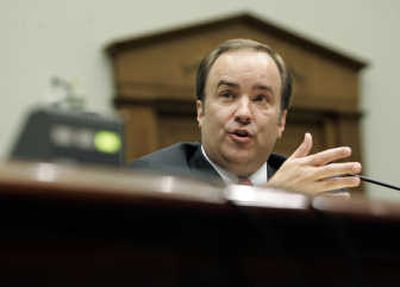McClellan repeats critique of Bush before Congress

WASHINGTON – Scott McClellan, the former White House spokesman turned Bush administration critic, took to Capitol Hill on Friday to decry an insular and secretive White House that he said lied about the leaking of a CIA officer’s name and “overstated” intelligence in the rush to war in Iraq.
McClellan, who served as President Bush’s press secretary from 2003 to 2006 and is the author of a controversial new book, also said Bush squandered the public’s trust by not following through on promises to fire those involved in disclosing the identity of CIA officer Valerie Plame and to publicly divulge details about the case.
“The continuing cloud of suspicion over the White House is not something I can remove, because I know only one part of the story,” McClellan said during several hours of testimony before the House Judiciary Committee. “Only those who know the underlying truth can bring this to an end. Sadly, they remain silent.”
McClellan was a longtime Bush aide whose best-selling book, “What Happened: Inside the Bush White House and Washington’s Culture of Deception,” has caused a political uproar. It contains sharp criticism of the president and his senior aides on a variety of topics, including the handling of prewar intelligence and the bungled response to Hurricane Katrina.
The former Bush insider received a warm welcome from the Judiciary panel’s Democratic majority, which attempted, generally without success, to get him to go beyond the material in his book. Republicans, meanwhile, lined up to question McClellan’s motives, attack his publishing house and press him on why he did not raise doubts while on the job.
McClellan returned to several key points during his testimony, including his stance that the Bush administration “sold the nation on the premise that Iraq was a grave and gathering danger” by using intelligence reports that were “overstated” and “overpackaged.”
At the same time, McClellan emphasized that he did not believe that Bush or his aides purposely misled the country about Iraq.
Judging from his testimony and book, McClellan was particularly unhappy about the way the Plame case was handled, including his unwitting role in passing on inaccurate information to reporters.
McClellan recounted a September 2003 episode, described in his book, that revolved around I. Lewis “Scooter” Libby, Vice President Dick Cheney’s top aide at the time, and Karl Rove, then political aide to President Bush. After receiving assurances from Rove, McClellan told reporters that Rove was not involved in the disclosure of Plame’s identity to the media.
Andrew Card, who was Bush’s chief of staff, contacted McClellan on a Saturday and said that Bush and Cheney wanted him to provide the same public assurances about Libby. After speaking to Libby, McClellan said, he informed reporters that Libby was not involved.
Courtroom testimony and other evidence later showed that both Rove and Libby had spoken to reporters about Plame, although neither was the initial source for Robert Novak, whose column was at the heart of the case.